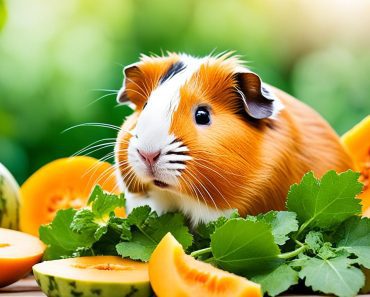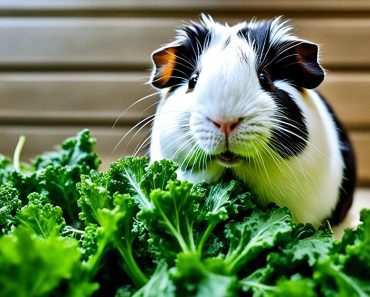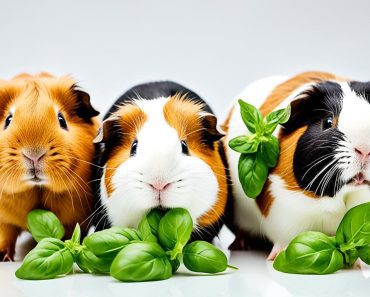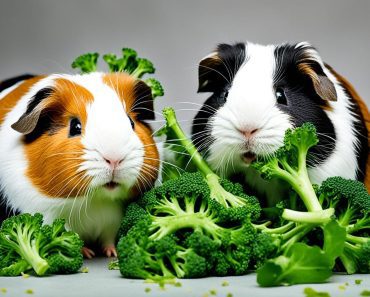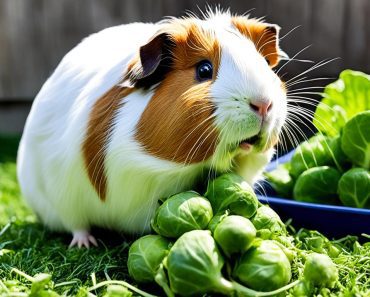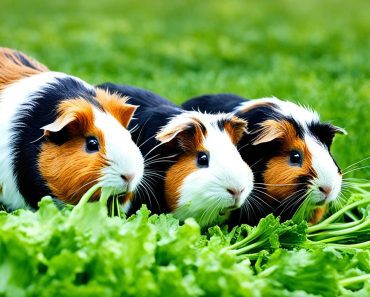As a guinea pig owner, I always strive to provide the best nutrition for my furry friends. One question that often comes up is, “Can guinea pigs eat parsley?” The answer is yes! Parsley can be a tasty and nutritious addition to a guinea pig’s diet.
Parsley is not only safe for guinea pigs but also offers a range of health benefits. It is packed with vitamin C, with 1333mg per 100g, making it higher in vitamin C than many other fruits and vegetables. This essential vitamin helps boost their immune system and promote overall health. Additionally, parsley is low in sugar and rich in calcium, which is vital for maintaining healthy bones and teeth.
When it comes to feeding guinea pigs parsley, moderation is key. While it is a healthy snack, it should not be the sole focus of their diet. It’s crucial to provide a variety of fresh foods, such as vegetables and fruits, to ensure a well-rounded nutritional intake. Italian parsley and curly parsley are both safe options for guinea pigs to enjoy.
One of the advantages of parsley is that you can easily grow it at home, ensuring a convenient and cost-effective source of food for your guinea pigs. Just imagine the satisfaction of seeing your pets munch on fresh herbs straight from your garden!
Can Guinea Pigs Eat Parsley? Yes, they can.
- Parsley is safe and nutritious for guinea pigs, providing high levels of vitamin C and calcium.
- Feeding parsley in moderation, along with a variety of fresh foods, ensures a balanced diet.
- Italian parsley and curly parsley are both suitable options for guinea pigs.
- Growing parsley at home can be a convenient and cost-effective way to provide fresh food for your pets.
- Consulting a veterinarian for specific dietary recommendations is always advisable.
Guinea Pig Diet: The Importance of Balanced Nutrition
A balanced diet is crucial for the health and well-being of guinea pigs. As pet owners, we must provide them with the right combination of foods to meet their nutritional needs. Let’s delve into the key components of a balanced guinea pig diet.
1. Grass Hay: The Foundation of Their Diet
Hay is an essential part of a guinea pig’s diet, providing vital fiber and aiding digestion. It should make up the majority of their daily food intake.
Adult guinea pigs should be given Timothy or orchard hay, which promotes healthy digestion without excess calcium. Alternatively, younger guinea pigs can benefit from the calcium-rich alfalfa hay.
2. Vitamin C-Fortified Pellets: A Nutrient Boost
Vitamin C is crucial for guinea pigs, as they cannot produce it on their own. Vitamin C-fortified pellets help fulfill their daily requirements.
It is important to feed these pellets in moderation, as relying solely on them can lead to selective eating and a lack of variety in the diet.
3. Fresh Vegetables and Fruits: A Rainbow of Nutrients
Fresh vegetables and fruits provide additional vitamins and minerals, and should be included in a guinea pig’s daily meals.
Leafy greens like romaine lettuce, parsley, and kale are great choices, as they offer a variety of nutrients. Fruits should be given in moderation due to their high sugar content.
4. Guinea Pig Treats: A Special Occasional Delight
Treats can be a fun addition to a guinea pig’s diet, but they should be provided sparingly to avoid excessive sugar intake.
Choose treats specifically designed for guinea pigs, or opt for small portions of fruits or vegetables that they enjoy. Remember, treats should be given in moderation.
“A balanced diet for guinea pigs includes grass hay, vitamin C-fortified pellets, fresh vegetables, and occasional treats. Variety is key to providing a range of essential nutrients for optimal health.”
Ensuring a balanced diet is crucial for guinea pigs to thrive. By providing the right combination of grass hay, vitamin C-fortified pellets, fresh vegetables, and occasional treats, you are offering your furry friends a nutritionally complete diet. Remember to introduce new foods gradually and monitor your guinea pig’s health and behavior to ensure they tolerate them well.
| Food | Benefits |
|---|---|
| Grass Hay | – Provides fiber for digestion – Aids in wearing down teeth |
| Vitamin C-fortified Pellets | – Essential for guinea pig health – Meets daily vitamin C requirements |
| Fresh Vegetables and Fruits | – Provides additional vitamins and minerals – Adds variety to their diet |
| Treats | – Offers occasional enjoyment – Should be given sparingly |
The Benefits of Parsley for Guinea Pigs
Parsley offers several health benefits for guinea pigs. Its high vitamin C content helps prevent scurvy, a condition that can cause lethargy and joint pain. The calcium in parsley is important for guinea pig’s bone health. However, it is important to feed parsley in moderation, as excessive calcium intake can lead to bladder stones. Parsley can be a tasty and nutritious snack for guinea pigs when included as part of a varied diet.
| Vitamin C Content | Calcium Content | Nutritional Benefits |
|---|---|---|
| Parsley contains a high level of vitamin C, with 1333mg per 100g. This is higher than many other fruits and vegetables. | Parsley is also rich in calcium, which is important for guinea pigs’ bone health and overall well-being. | The combination of vitamin C and calcium in parsley contributes to the overall health and vitality of guinea pigs. |
Feeding parsley to guinea pigs in moderation can provide them with essential nutrients and support their overall health. However, it is important to remember that parsley should be part of a balanced diet that includes a variety of fresh foods. Feeding parsley as a snack or occasional treat can be a great way to add flavor and variety to your guinea pig’s diet.
“I love offering my guinea pigs parsley as a snack. It’s not only packed with vitamin C but also provides them with an enjoyable and flavorful treat. Just remember to feed it in moderation and include a range of other fresh vegetables and fruits in their diet for a well-rounded nutritional intake. Your guinea pigs will surely thank you!” – Guinea Pig Lover
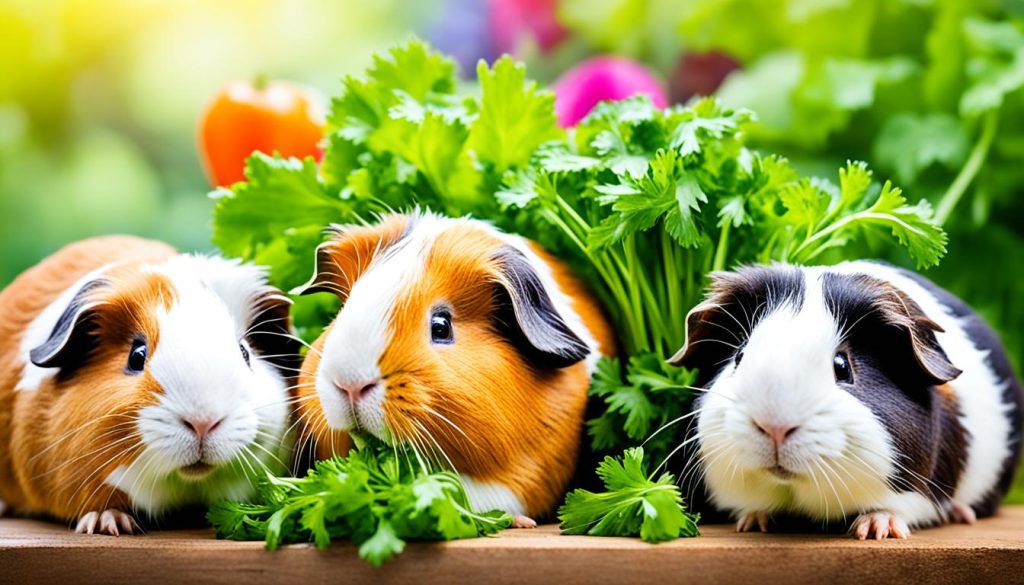
Guidelines for Feeding Parsley to Guinea Pigs
When it comes to feeding parsley to guinea pigs, it’s important to follow some guidelines to ensure their health and well-being. While parsley is safe for guinea pigs to eat, it should not be the sole focus of their diet. Instead, offer it as part of a varied and balanced menu that includes other fresh vegetables and fruits.
Feeding parsley in small portions is key to prevent any potential nutritional imbalances. Guinea pigs have sensitive digestive systems, so it’s crucial to avoid feeding them large amounts of any one food. Instead, provide a good variety of foods each day to promote optimal health.
Here are some specific guidelines to keep in mind:
- Portion size: Offer small amounts of parsley to your guinea pigs. A few sprigs or leaves per serving is sufficient, depending on the size of your pet. This helps prevent overeating and ensures a balanced diet.
- Feeding frequency: Incorporate parsley into your guinea pig’s diet a few times a week. This provides variety and allows them to enjoy the nutritional benefits without overindulging.
- Variety in diet: Alongside parsley, include a diverse range of fresh vegetables and fruits to ensure your guinea pigs receive a wide range of nutrients. This variety helps prevent boredom and provides a well-rounded diet.
By following these guidelines, you can ensure that parsley becomes a healthy and enjoyable part of your guinea pig’s diet. Remember to always monitor their overall well-being and adjust their food portions accordingly. A well-balanced and varied diet will contribute to their long-term health and happiness.
With proper care and attention to their nutritional needs, your guinea pigs can thrive on a diet that includes parsley and other nutritious foods.
Other Safe Foods for Guinea Pigs
In addition to parsley, there are many other safe and nutritious foods that guinea pigs can enjoy. It’s important to provide a variety of options to ensure they receive a well-rounded diet. Here are some guinea pig-friendly vegetables, fruits, and healthy snacks:
Leafy Greens:
Leafy greens like lettuce, spinach, and kale are excellent sources of vitamins and minerals for guinea pigs. These greens provide essential nutrients and help support their overall health.
Vegetables:
Other vegetables that you can include in your guinea pig’s diet are bell peppers, carrots, and zucchini. These vegetables are not only safe but also provide additional vitamins and fiber that contribute to their well-being.
Fruits:
While fruits should be given sparingly due to their high sugar content, they can be offered as occasional treats. Strawberries, kiwis, and oranges are popular choices that provide natural sweetness and a variety of flavors.
Remember to introduce new foods gradually and monitor your guinea pig’s response. Some guinea pigs may have preferences or sensitivities to certain foods. It’s important to provide a balanced diet and consult with a veterinarian for specific dietary recommendations.
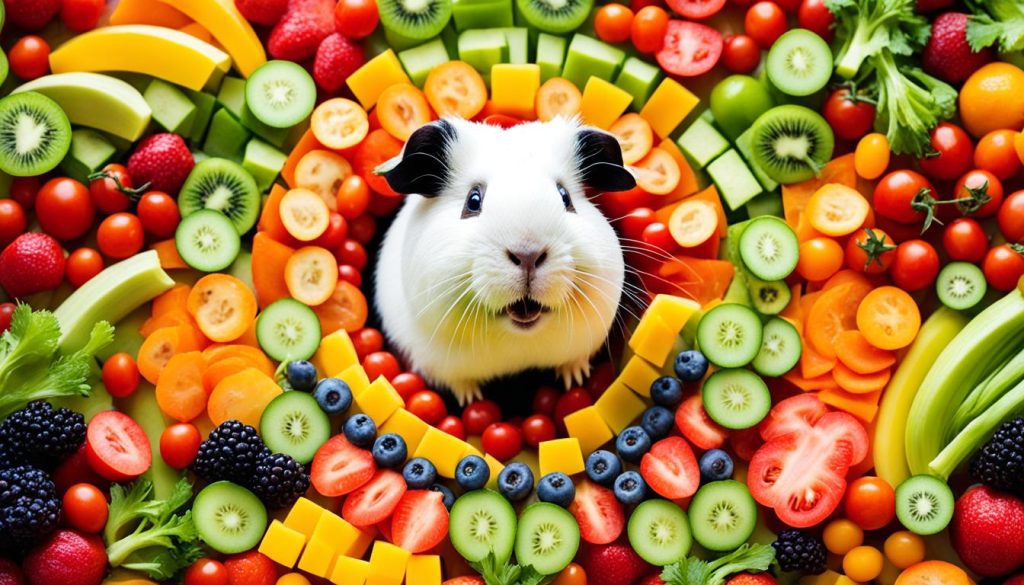
Precautions and Considerations
While parsley is generally safe for guinea pigs to eat, it is important to be aware of the potential risks. Parsley contains oxalates, which can contribute to the formation of bladder stones in some guinea pigs. It is crucial to monitor your guinea pig’s health and take necessary precautions to prevent any complications.
Bladder Stones in Guinea Pigs
Guinea pigs are susceptible to developing bladder stones, which can cause urinary tract issues and discomfort. Oxalates, naturally present in certain foods like parsley, can increase the risk of bladder stone formation. These stones can obstruct the urinary tract, leading to infections and other complications.
Consulting a Veterinarian for Guinea Pig Diet
I highly recommend consulting a veterinarian or a knowledgeable breeder when determining the most suitable diet for your guinea pig. A professional can provide tailored advice based on your guinea pig’s individual needs and health history. They can help you create a well-balanced diet plan that minimizes the risks associated with bladder stones and other health concerns.
Monitoring Your Guinea Pig’s Health
Regularly monitoring your guinea pig’s health is essential to detect any signs of discomfort or changes in their behavior. Keep an eye out for symptoms such as straining during urination, blood in the urine, decreased appetite, or lethargy. If you notice any of these signs or have concerns about your guinea pig’s well-being, consult a veterinarian immediately.
“Proper care and monitoring play a crucial role in maintaining a healthy guinea pig. By staying vigilant and working closely with a veterinarian, you can ensure your furry friend’s well-being and prevent potential health complications.”
Remember, prevention is key when it comes to bladder stones and other health issues. While parsley can be a nutritious addition to your guinea pig’s diet, it is important to feed it in moderation and consider your guinea pig’s specific health conditions. Prioritize a balanced and varied diet by incorporating a range of fresh vegetables and fruits to promote optimal health and well-being for your beloved pet.
| Precautions and Considerations | Key Points |
|---|---|
| Oxalates in Parsley | Contribute to bladder stone formation |
| Consulting a Veterinarian | Expert guidance for personalized diet recommendations |
| Monitoring Guinea Pig’s Health | Stay vigilant for signs of discomfort or health changes |
Conclusion
Parsley can be a nutritious addition to your guinea pig’s diet, providing essential vitamins and minerals. However, it is important to feed parsley in moderation and as part of a varied and balanced diet. Remember to include a good variety of fresh foods, such as vegetables and fruits, to ensure your guinea pig receives all the necessary nutrients.
Monitoring your guinea pig’s health is crucial, and if you have any specific concerns or questions about their diet, it is always best to consult a veterinarian. They can provide you with personalized advice based on your guinea pig’s individual needs and health history.
By following these feeding tips and guidelines, you can ensure that your guinea pig has a healthy and happy diet. Remember to prioritize their well-being and provide them with the best care possible. Your furry friend will appreciate it!

